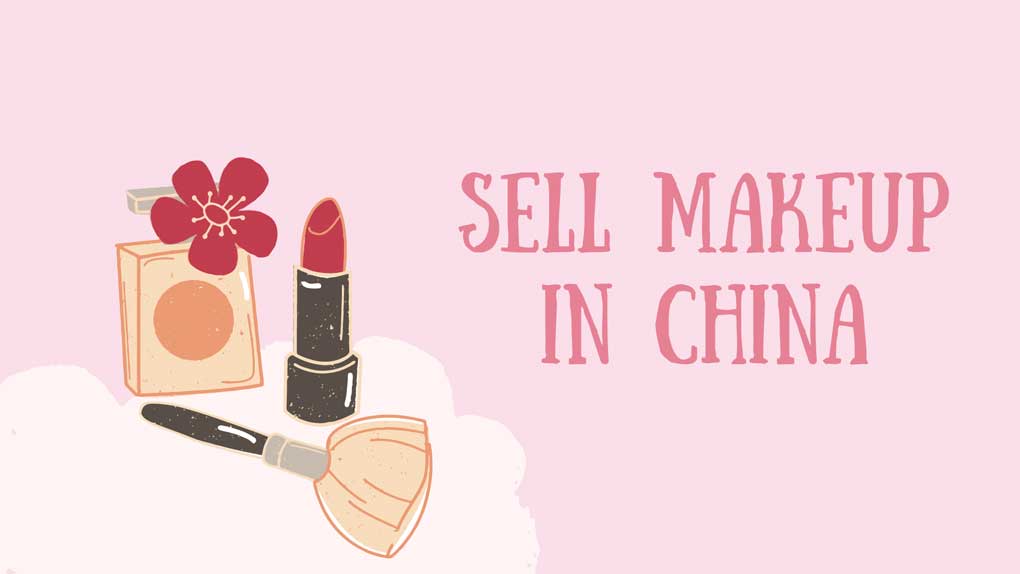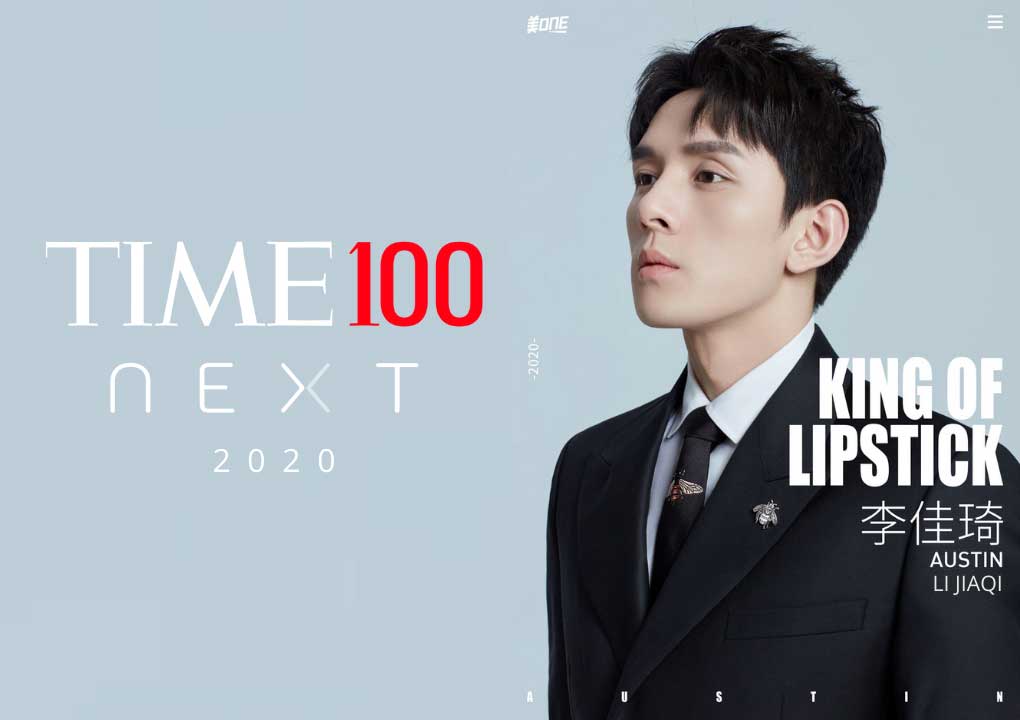Makeup brands have a huge potential in China, this market is still booming in 2022, specially on e-Commerce.
In terms of market potential, China is the Holy Grail for make-up brands. Chinese women are fiercely independent and love to experiment with their looks and the Chinese make-up market has been expanding at a rapid pace. There is a growing demand for high-quality and innovative make-up products in China, presenting opportunities for brands seeking to expand into this market. As a make-up brand looking to break into the Chinese market, you’ll need to account for the country’s unique distribution and sales landscape. Here we outline some of the most efficient ways to distribute, sell, and promote your make-up brand in China. By understanding the various channels available to you, you can position your brand for success in this lucrative market. So read on for tips and tricks that will help get your make-up line off the ground in China!
1. The Chinese Makeup market: Growth & Opportunities
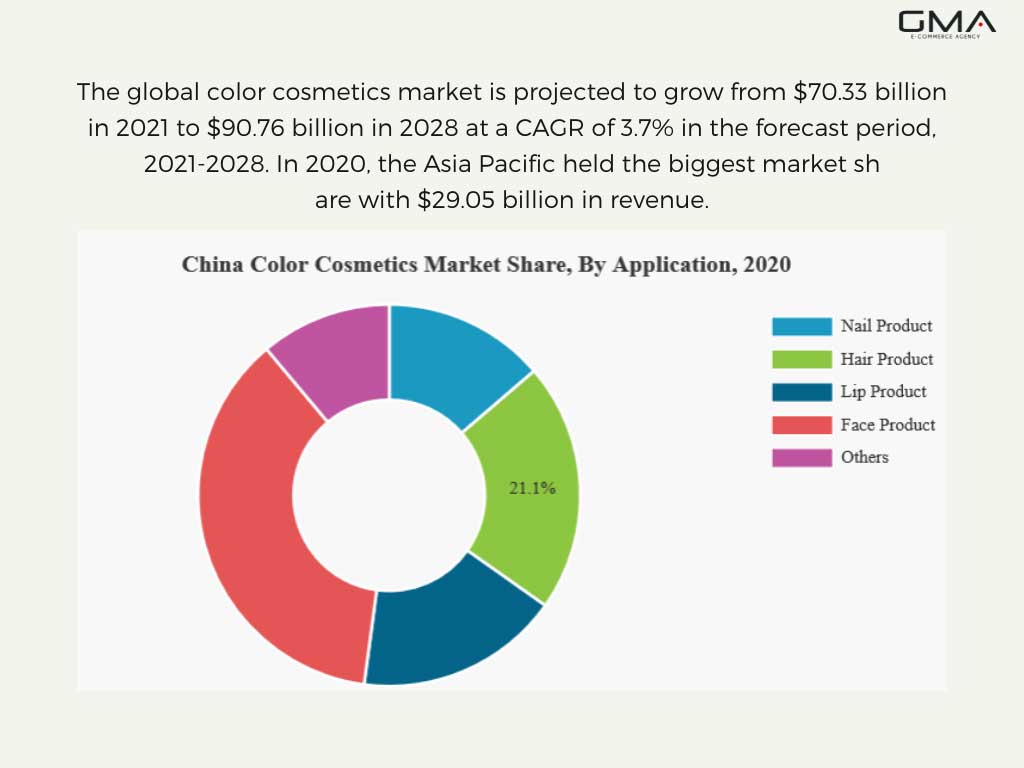
What is the market size of China Color Cosmetics (makeup) Market?
- The Chinese makeup registered $5.9 Billion in revenue in 2020 and is forecasted to reach $8.9Billion revenue by 2025 or a growth rate of 8.3% per year (forecast by Global data).
- While many people in China are becoming interested in skincare products, it doesn’t mean that makeup brands aren’t experiencing rapid growth. In fact, the opposite is true! This statement holds especially for beauty enhancement goods such as color correcting (CC) and blemishes balm cream.
- People born in the 1970s-1990s are the leading force of the Chinese cosmetics market. Their consumption accounts for nearly 90%, of which nearly 40% is contributed by those born in the 1980s.
- Online retail is the leading way of purchasing makeup in China with 36.7% in 2020 which is quite the jump from 5.3% in 2010!
- In 2019, the average Chinese consumer spent 39 yuan on makeup. Consumers from first-tier cities recorded an average per capita spending of 183 Yuan, more than four times higher compared to national levels.
Read as well: Guide to Selling your Brand on China Cosmetics & Beauty Market
Key Segments & Trends of China Makeup-Color Cosmetics Industry:
- Foundations & face make up: This makeup segment is one of the fastest growing in China. For instance, in 2019, it registerred a 257% YoY growth. This is a significant amount when compared to other categories, including an average growth rate that reaches only 151%.
- Eyes makeup: In terms of growth, it is right behind face make-up and is expected to register almost 8% average annual growth from 2020 to 2025. Actually, in 2020, while most makeup categories sales went down, the eyes make up segement rose by 13 percent year-on-year (Kantar Worldpanel China)
- Skincare in makeup: In response to consumer desires for quality-consciousness when applying make up or taking care of one’s self externally , many cosmetic brands now incorporate such functionalities into cosmetics as well . For instance there is a lipstick trend called “Vitamin C Lips” which has gained traction among fashionable women looking not only proudly owning themselves but feeling confident that all areas from head down require some love too
- Male Makeup: Although this one is still very niche and somewhat “controversial“, it is a niche segment that is gaining more and more popularity in China and which demands has yet to be answered. For instance, tmall Double 11 2020 data showed a rise of +3000% for male beauty goods.
- Overseas Niche makeup brands: The popularity of overseas niche brands is on the rise, with Chinese consumers paying more attention to textures and functions. Frequent mentionings these items across social media platforms has drawn many people in search for new product innovations. Women under 30 are the main force driving this specific segment.
2. What are some of the challenges of selling make-up in China:
- Evolving & Complex Regulations: The Chinese cosmetics market has its own regulations that are ever changing and evolving and it can be hard to keep up with them espcially because it is not easy to find them in english if you don’t know where to look for it. Read about Chinese regulations to sell cosmetics goods in China here.
- Chinese Business License: When doing anything in China, having a Chinese business license comes handy for many things such as selling on Chinese Local eCommerce plateform. Getting an ICP licence for your website URL to be in .cn and get a boost on chinese search engines; open social media business account etc. If your brand does not have a Chinese business licence you may find that your option are limited when it comes to selling in China as well as doing marketing.
- Counterfeit: It is well known; succesfull brands get copied shamelessly by locals groups and there is not much you can do to stop this from happening.
- Fierce Competition: Everyone wants a piece of of the chinese cake, thus the incredible competition from both internationnal and locals make-up and beauty brands
- Distributing and Selling yourbrand in China: this is tied up in part with the competition. Because so many brands are trying their luck in China, Chinese make-up distributors can be picky with the brands they want to resell. Therefore, if you make up brand has nothing that make it stands out from the crowd, you don’t stand a chance. On top of that, it can be tricky to deal with a distributors here. We invite you to read more about the topics here.
3. How can you overcome these challenges and succeed at selling your brand there:
- Understand China Cosmetics Regulations: When it comes to follow regulations in China, your best bet is to work with locals. It could be your locals office whith specialists of the question; export experts our even agencies like ours that are used to help companies selling in China. In terms of accessible ressources, check out governemental websites such as this one, it is in english and post updates on laws and business news on regular basis.
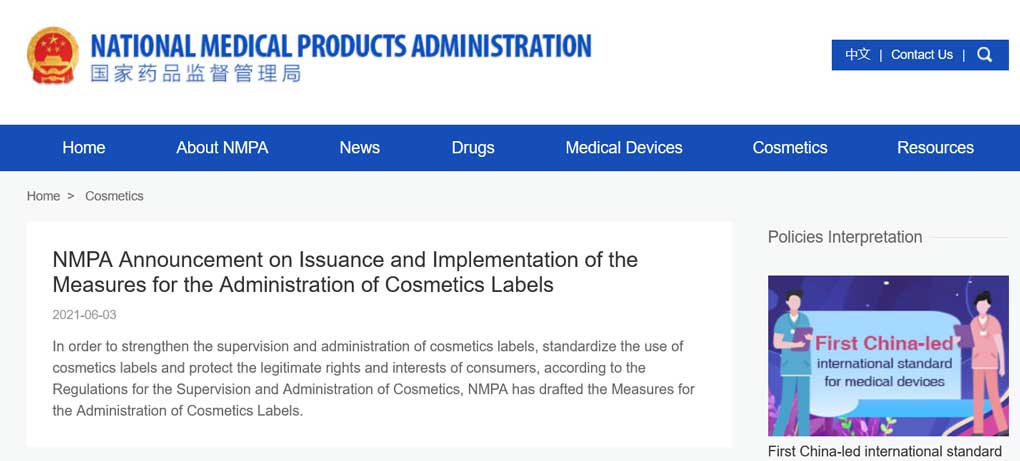
- Ressources getting Business Licence & Protecting brands
- Getting a chinese business license seems overly complicated and pricey but it is more simple that you think if you know what you are doing. You can find out the whole process here. Since having a Chinese business license can facilitate selling & promoting a brand in China, we often suggest our customers to get one right away. It’s a step forward into penatrating the chinese market and protecting your brand integrity there as well. (Contact-us to learn more about registering your company in China and its cost)
- To fight counterfeiting or at the very least protect your brand legally in China, you need to trademark your brand in the country. We would strongly suggest you to do so before even getting started if you are serious about your project in China. China is a first to file trademark system, meaning that if you are not first to register your brand and someone else does it, you legally won’t be able to do anything and the others company using your name will be within its legal rights and could even sue you for using “their name”. Trademark registration can be a pain and we suggest that your hire a specialists like us to take care of it rapidly and at minimum cost. (Read more about the Trademark registration process in China)

- Resources for finding distributors: There is no real fast solution to finding a distributors in China because of the reaons we talk about just above. Finding a reliable distributors in China will require some paramount work on brand awareness on your part and you an forget about mass mailing because this channel does not work. The idea behind working on your brand awareness in China is to make you stand out as a brand with potiential on the market. It will hugely help with your distributors prospection effort. Working on your online visibility will also unable lead generation, meaning, distributors contact you because they are interested in working with you. This may not be what you wanted to hear, but this marketing efforts won’t be lost ressources as it will help you find a distributors and have brand awareness in the market, all in all it will open more options to sell your products in China. Over the year, our agency have help cosmetics brands with finding distributors, and the combinasion of online visibility (Baidu SEO, Social media, PR) + prospection seems to be the most efficient way to convince them to work with brand, whereas introduce unknow brands to our list of distributors unfortunatly did not bear any fruits. (Read more about this technique here).
- Selling Make-up Online in China: eCommerce in China is one of the best way to sell your makeup brand. As a matter of fact, the online retails sales of cosmetics in China has been constantly increasing for the last few years. Selling on ecommerce platform gives you a level of control that you will never achieve with a chinese distributors and frees you from the whole prospection process. There are so many options when it comes to ecommerce that any brands serious enough to getting started on the Chinese market could be doing so within a few months. So lets have a look to some of the best options out there for make up brands in China:
- Tmall: The incontested leader of ecommerce in China. Tmall is highly trusted by chinese consumers because of its strict brand enrollment and custmers services policies. Tmall was for a very long time innaccessible to most brand but with the 2021 enactment of the chinese anti-monopoli law and the rise of new ecommerce competitor, the platform has started openning to even small and medium companies through enrolment programs specifaically designed for them. Tmall ofers two mains option: Local tmall and Global Global. The global version allows brand with no precense in China to try open a store and sell through cross border ecommerce with not chinese business license. Collaborating with Official Tmall Partners (like us) increases your chances of integrating the platform.
- JD: JDcom is very similar to Tmall is the way it works and recruite brands as well as the type of store and options it offers to brands. It too has an cross-border options for instance and just like Tmall has started to open up to smaller brands.
- RED Store: The RED Store is the ecommerce features of the app Little Red Book (Xiaohongshu). This store are a lot more accessible to everyone in terms of fees and also offers a cross-border functions. The benefits of selling on RED Store is that it offers a 360 degrees experience to users who can scroll on a store and access the social media app users shopping note/live streaming within a click. We suggest this app to make brand in China as it targets young & active women from wealthy chinese with an interest in the live-style and beauty segment.
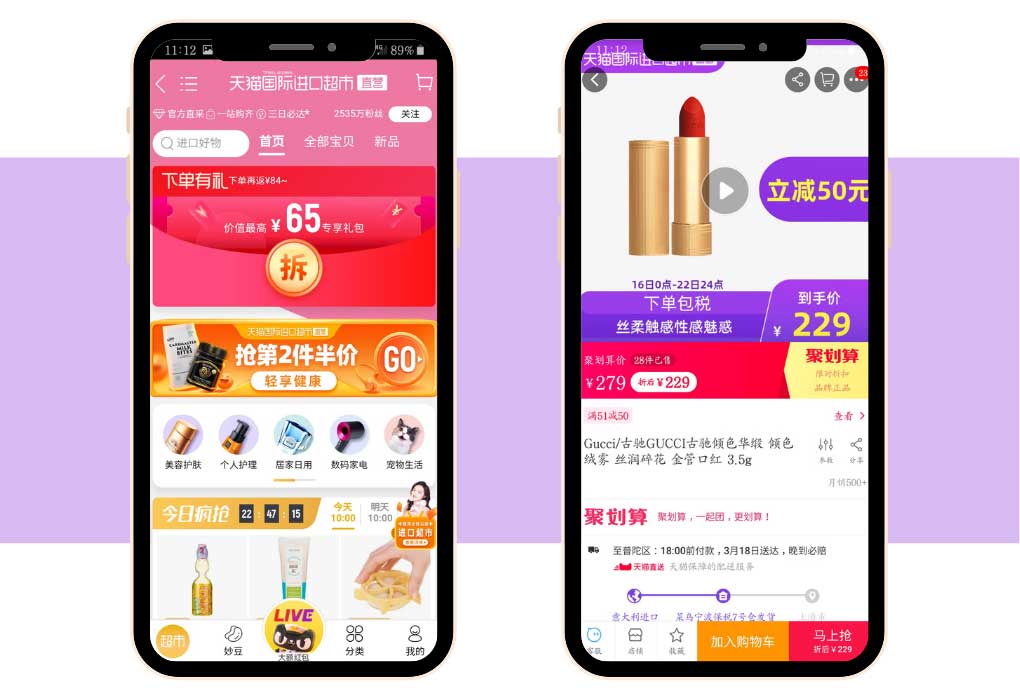
5. Steps for success when marketing your makeup brand in China: Build eReputation:
Get your Make-Up Brand a Chinese Name:
A good Chinese name for your make-up brand ensures that Chinese consumers will be able to identify you right away. It shows commitment and a willingness to adapt to yourself specifically to the Chinese language and consumers. Thus a localized branding strategy should start off by choosing an appropriate name you’ll use everywhere to promote your make-up brand there. Not only it will help you stand out from the crowd, but your Chinese brand name will also stand as an embodiment of your brand’s values and story adapted to the cultural norms in China.
There are several ways you can come up with a Chinese name, but we would also suggest you refer to locals through market research before making the final call. What is the different way of choosing a name in China for your brand?
- Phonetic translation: It works as long as the chinese caracteres don’t have a bad meaning and it does not sounds like another word that has a negative meaning. Check out its not an internet slang either. One of best exemple of phonectic transaltion is Gucci. 古琦, the first caractere means something ancient/classical while the second refers to valuable stone. It works perfectly to represent what Gucci stands for and the types of products the brand sells.
- Focusing on Brand Values & Goods: An excellent way to make sure chinese consumers knows what you sell and what you stand for right away. The best exemple would be carefour with 家乐福 household happiness but we are talking makeup brand here. A good exemple is the Korean Brand Mamonde which translated its name into 梦妆 (mengzhuan). 梦 can be translated as dream/dreaming as well as fancy; illusion while Zhuang litteraly means make put on make-up. Seing this two caractere next to each others, consumers know righ away what they are looking at.
Read more about The process of finding the right Chinese Name for your brand in this post
Register official account on Chinese social Media & why you need it
- Business Tools: Having official account on chinese social media give you access to every marketing tools availables on the platform which depending on the app are many. Having access to these tools are keys for your digital marketing stragegy in China and to reach out to customers while being identifiable as the real deal.
- Protection: Official Account registration come with “verified” icone showing you are the official brands and that only what is posted on this specific account is worht to be taken seriously or/and officialy. It will protect you against malicious individuals/groups that could use your name for profits and with intent to hurt you reputation.
- Visibility & Credibility: Finally having official account on chinese social media not only give you access to marketing tool but will also get your more visibility on both the app and on Chinese search engines. Having official account also show consumers that you are real brand since registering is a whole process that requires many documents to prove your legitimacy as an organization. It shows you are real and that you have enough ressources to go through the process, hence reassuring consumers.
Note that these observations are valid as well if you are looking for a Chinese makeup distributor – Find out about our Chinese social media marketing Solutions
For eReputation your Makeup Brand needs a Chinese Website
Having a website in Chinese is another step you take that shows Chinese consumers that you are real and reputable and that you care enough about them to create a website specifically targeted at them. Although your website won’t be your main source of traffic or conversion in China (read more about this topic here), you need one to unlock Baidu SEO and Paid Ads which are crucial for your visibility on the Chinese internet.
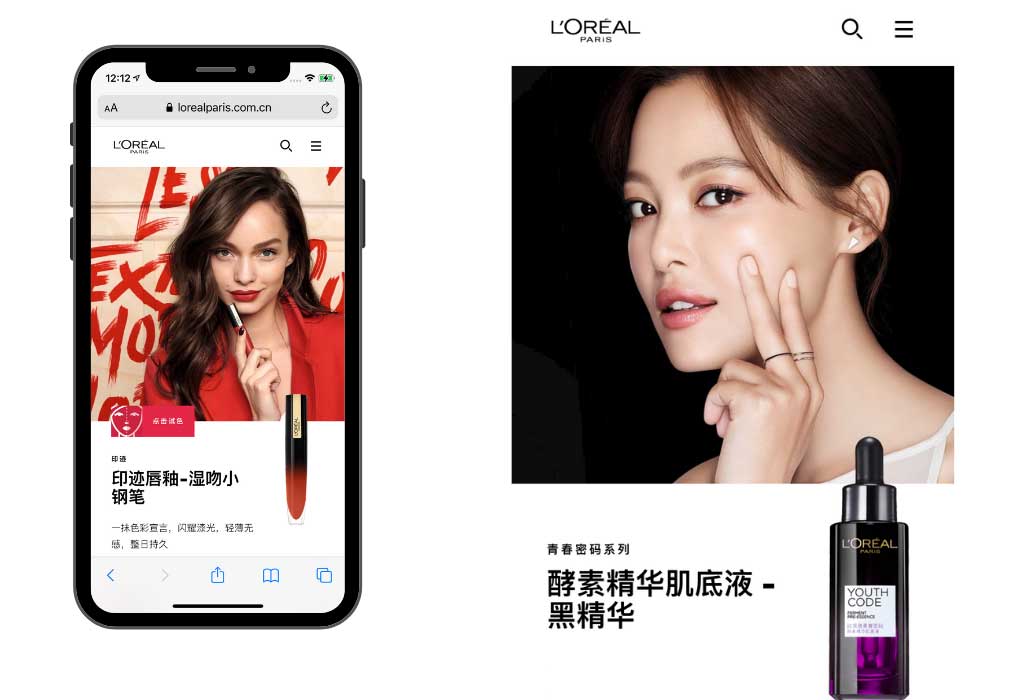
Your website needs to be localized and hosted in China (require ICP license & Business license) or neighboring countries for fast loading. It has to be in Chinese mandarin to appeal to both Baidu and Chinese netizens as well as have a beautiful design that is mobile friendly with featured social media and contact info! Lastly, you need to post content regularly but make sure your content respect China’s internet laws.
6. How to use Chinese Online Plateform to promote your makeup brand in China?
Baidu SEO/PPC how-to & Benefits
Baidu is China’s number 1 search engine both on mobile and desktop. When it comes to mobile it dominates the market with 95% of the market share as of 2021. Baidu is an important step in the Chinese consumer’s purchase process. Chinese consumers, wary of fake brands and unsafe products will do their research before placing an order anywhere and most time it is done through Baidu.
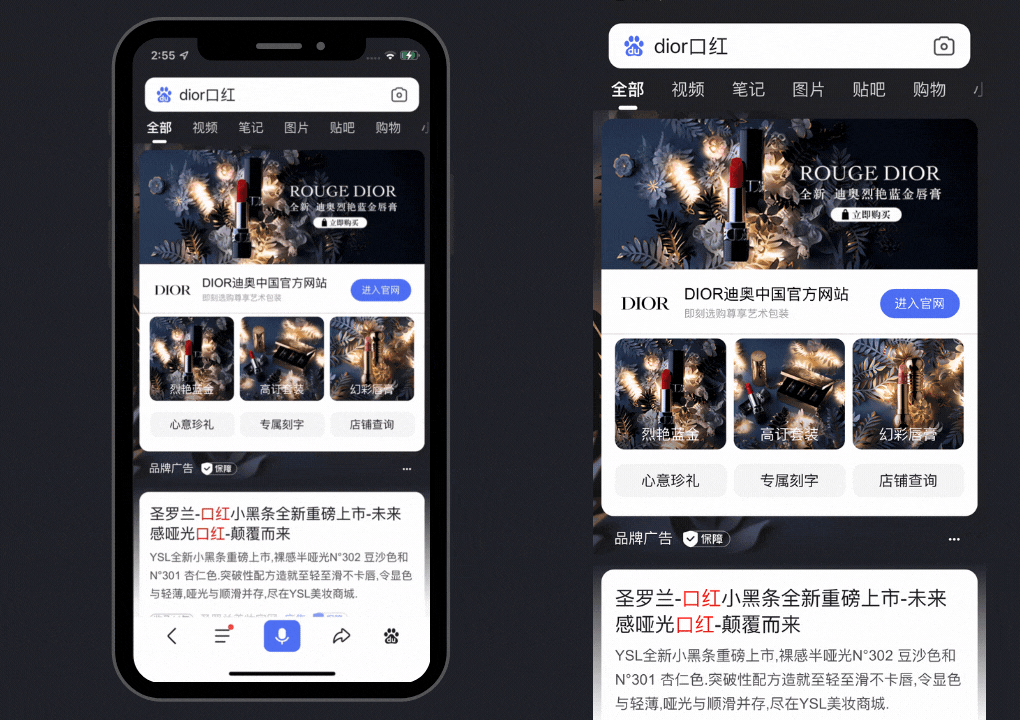
There are two main benefits with Baidu SEO & PPC
- Visibility: Ranking on competitve targetted keyword with your website is an efficient way to reach out to your target audiance and aquiere new customers. Both paid ads and organic resuts are excellent for customers aquisition but PPC will be more expensive and won’t last as long in time as organic results. PPC are still a great way to gain some initial traffic.
- Credibility & concersion: The more you appears in Baidu’s SERP the more credibility you gets. Seeing a lot of search results pointing out to your make up brands is reassuring for customers. It shows that one your company is real and two that others poeples have already bought from you, which ultimately will help you increase your conversion rate.
When we talk about Baidu SEM we also would like to include what we call undercover marketing. Undercover marketing helps you rank on your keyword through 3rd parties websites and apps making it seems that you are well known and talk about throughout all Chinese media and media. Ideally, this mention is organic, but you can boost it at the beginning by creating content yourself, collaborating with KOLs, paying for PR on specialized beauty forums, and so on.
When using Baidu, here is the thing you’ll have to focus on:
- KW research: Define targetted Keyword related to your make-up brands and make up that you would like to be indexed on page 1. These Keywords research will be crucial for paid ads but also to SEO. SEO being time consuming , you do not want to put ressources on Keywords that won’t bring you interesting traffic or that are way to competitive to stand a chance. Same goes for PPC for monetary reasons.
- Backlinks: If you are familiar with google, you already know that backlinks will help boost pages of your website, it works the same on Baidu. Ultimately, it will also bring you referral traffic.
- PR: Important for your brand reputation (+ can also be used for backlinks). Having trusted third parties talking about your brand is the best promotion possible.
- Ads Campaign: There are many types of paid Ads available with Baidu. One of the most efficient one is the brand Zone. Brand zone is a very well integrated ads that takes up halp the Baidu SERP on a branded keyword. It features severals links to websits, online store, social media reviews, videos and so on. It is higly customizable and grab the attention immediatly.
Chinese Social Media & Kols Marketing
Social media is important for businesses in China for two main reasons.
- First, social networks are a primary channel of communication for many brands to connect with their customers and potential customers.
- Secondly, it’s also an effective way to promote your product without utilizing too much advertising dollars.
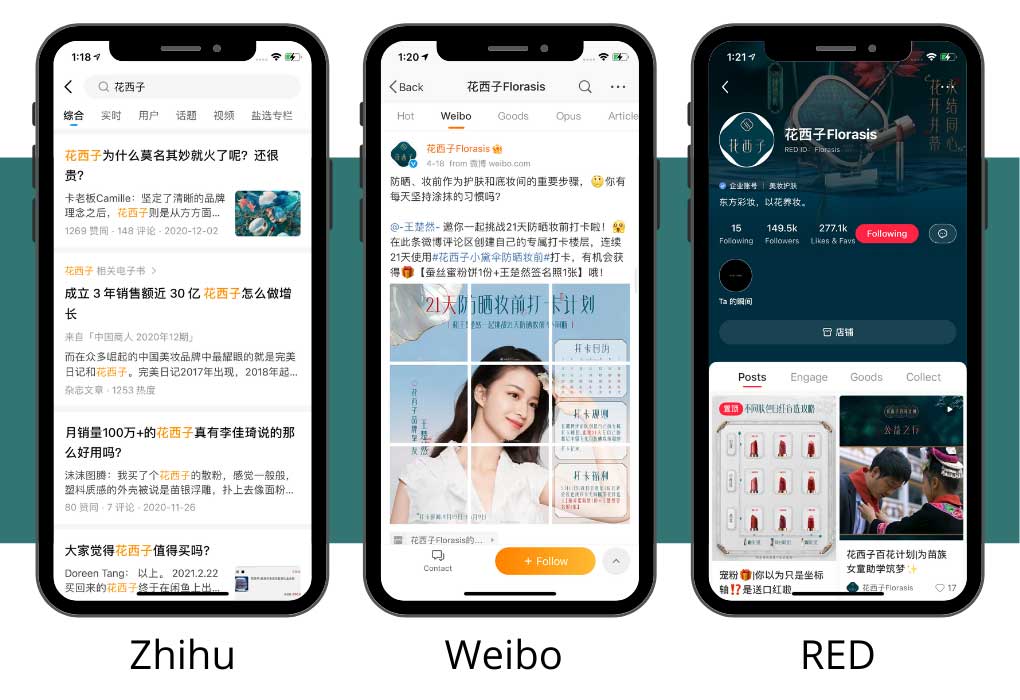
In traditional China, public opinion is always right. Businesses were powerful because of their relationship with people from all levels of society. In the Internet age, public opinion takes a backseat to facts and figures. In order to get ahead in life, Chinese people look for brands that are successful on social media platforms, especially where big markets have been created such as WeChat and Sina Weibo. Marketing through social networks can be very beneficial because you build up an audience who trusts you and who spreads the word about your brand after they buy from you or experience your branding offline or at least hear others talk about it.
Let’s check some of the most prolific Chinese media that are well suited to promote make-up brands
WeChat: main tool and why use it – example of a brand using WeChat
With more than 1 billion users as of 2021, Wechat is China’s most popular social media app. WeChat has become a valuable opportunity for marketers to reach consumers. Engaging content, promotions, and offers are effective ways to promote brands through WeChat marketing.
However, promoting a make-up brand in China can be a difficult task for companies new to the market. Although brands should absolutely be on the app, they should not treat it as a social media to grow a huge following or create the buzz and more like a nurturing app, almost like an alternative to email marketing where they can also sales their products if they want. Wechat is essential for credibility but should be 1 of your marketing channel within your omnichannel strategy.
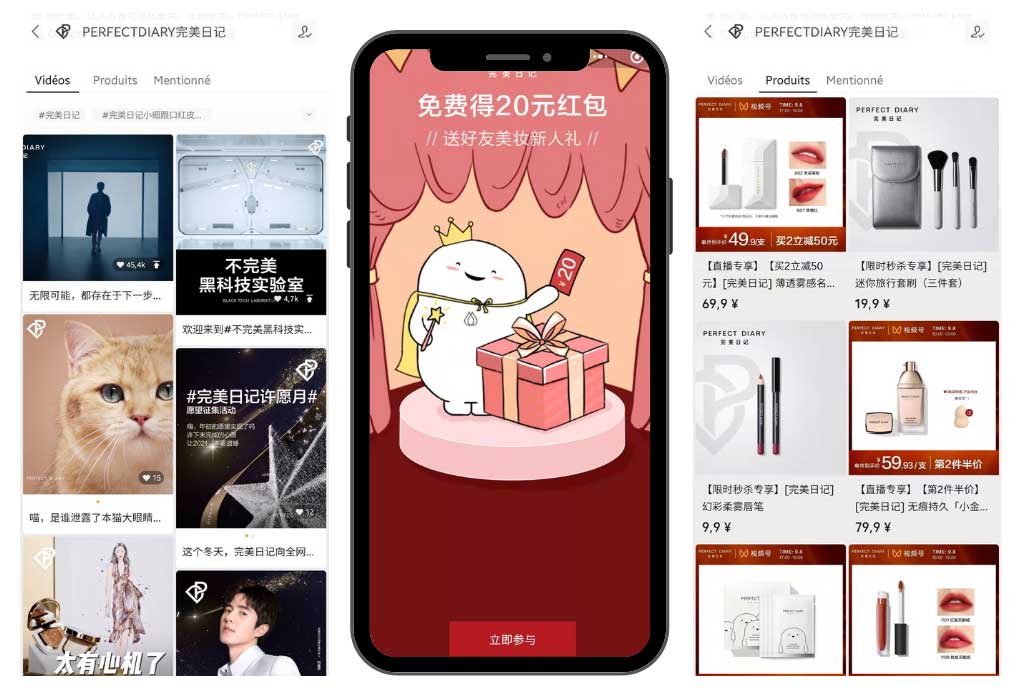
Now, mastering marketing on Wechat is not an impossible task and some brands are absolutely killing it. let’s take Perfect Diary for Instance. They are using every marketing tool and trick on the apps to create a tight community of buyers:
- Wechat Official Account – Checked
- Regular Original & Quality posts published – checked
- Group Marketing -Checked
- Live-streaming – Checked
- VIP Invitation – Checked
- Wechat Channels – Checked
- Mini-Program – Checked
- Store – Checked
- Wechat Ads – Checked
Read more about the Perfect Diary whole WeChat Strategy
Weibo: the Chinese social media to engage with your Audiance and be commercial
Another popular social platform is the microblogging website called Sina Weibo and as of 2021 count more than 520 million monthly and 230 million daily active users. This Chinese Twitter-like service has been growing in recent years, with more and more people turning to it as a way of sharing quick messages online that can be up to 140 characters including videos pictures links.
Sina Weibo is the app marketing and brands do not want to ignore it when doing online marketing in China. Indeed, it has incredible potential when it comes to building a large following and being commercial and engaging. Because of its open nature, brands using Weibo to its full potential will not only be able to hook their customers base but also to reach out to new audiences.
Weibo and Commercial Content
Unlike WeChat where ads and commercials content is not well received (and the ads system is not so well designed for marketing on top of being very expensive), Paid ads are a staple of Weibo (a little bit like Facebook ads). Paid promotion on Weibo have two main formats: Paid Ads and Kols Collaboration (we will talk about Kols marketing in a few paragraphs)
- Weibo Paid Ads:
- Banner Advertisements
- Weibo Search Engine Promotion
- Fan Headline (“Fanstop”)
- Fan Tunnel
Read more about Weibo Paid Ads
Olay on Weibo
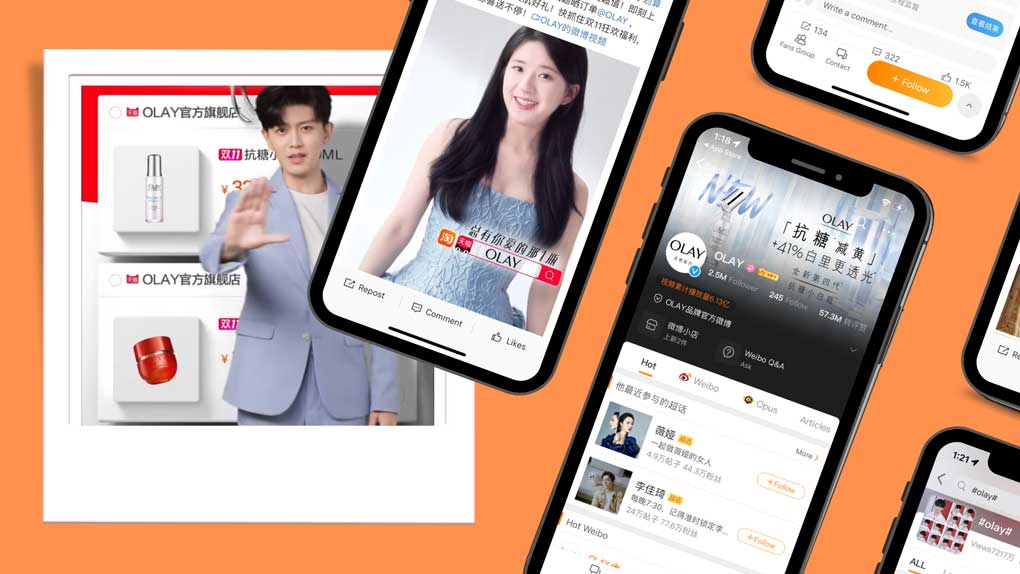
In 2020, Olay was among the most successful make-up and beauty brand in China. Its marketing effort mainly revolved around creating buzz potential content on Weibo & Wechat, notably choosing video formats. Olay combined its social media effort with live-streaming and smart promotion through Tmall. For 11.11 2021, Olay collaborated with Tmall and famous Kols using the video format. These videos were then shared on Weibo by the brand, Tmall and involved Kols reaching an incredible amount of Weibo users.
Make-up brands gotta make good use of China’s #1 Beauty & Lifestyle Social Media
The Little Red Book App is a social e-commerce shopping platform that helps users discover and buy luxury, fashion & beauty products from overseas as well as sharing tips on what to wear, how to use a type of cosmetics, brands that they should check out, promotion and so on. It brings together elements of UGC, product reviews, and pre-purchasing play an important role for Chinese consumers before buying products on this site as they want recommendations from other users that have already bought what you are looking at purchasing.
Xiaohongshu offers many ways to promote brands and their products in China. These include opening an official account, partnering with KOLs – Key Opinion Leaders, and traditional paid ads.
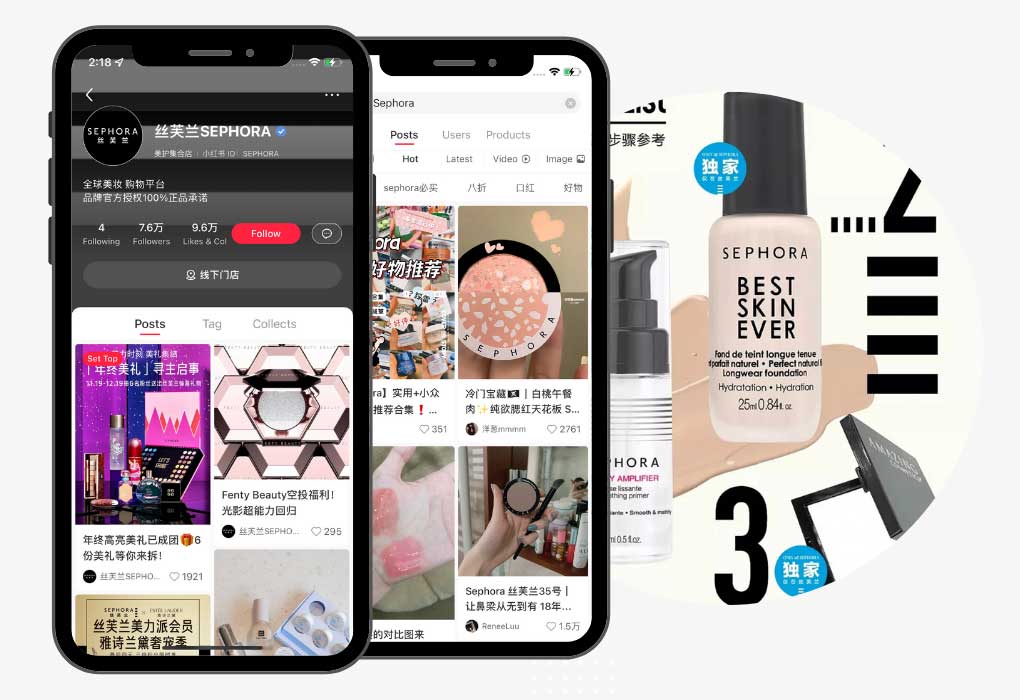
Why makeup brands should be Xiaohongshu?
- Chinese consumers are more likely to trust a product rating from other people than they would an official source. Little Red Book, which is based on user-generated content or word of mouth marketing through shopping notes helps with that and has also created the perfect environment for KOL (known as ‘Kuritas’) Marketing strategies!
- The app target audiance is Gen Z and Milenials womens from wealthy chinese cities interesting into beauty and lifestyle products such as make-up.
Read more about Xiaohongshu Marketing with our guide
Kols Marketing in China
Chinese netizens treasure what Chinese celebrities and influencers wear or recommend and it’s especially true when we are talking cosmetics, fashion, and luxury. The phenomenon is even more pronounced in smaller size Chinese cities with 87% of luxury consumers taking their cues from influencers against 75% in 1st and 2nd tiers Chinese cities.
You may wonder why is that. Well, the short answer is Chinese consumers trust word of mouth and peer reviews more than official communication from brands. Recommendation from peers is actually the first criteria when purchasing a new product, even ahead of prices. Kols and Influencers, although they are mostly brands sponsors, have won the trust of their followers over time and built a strong relationship with them. Therefore, their recommendations are seen as legitimate.
Live-streaming has amplified the KOLs phenomenon in China, giving even more room for Chinese Kols to capture the attention of their followers and promote more products with always more discounts pushing for instant purchases which are traditionally not a thing.
Brand and Kols when collaborating with each other associate their names. It is crucial for both brands and Kols to be extra careful when choosing who they are gonna work with. Indeed, Kols Marketing is great to promote your make-up brand in China, but you would not want to take the risk of associating yourself with someone that is not reliable or that has some “shady” history.
Hiring a specialized agency to assist you with selecting wholesome and trustworthy KOLs is the best recommendation we have for you. Indeed, not only a KOLs agency will already have a network of KOLs that they regularly work with and that can be trusted but they systematically do a background check to determine the risk rate of those KOLS. Because agencies work on the regular with those KOLs they are able to offer these services at the best prices and ensure quick campaign launches.
Read more about KOLs marketing in China
The Chinese Color Cosmetics (makeup) Market will bring big money for brand that can keep up with its Evolution
The Chinese makeup (color cosmetics) segment is registering the fastest growth of the whole cosmetics industry in China and offers opportunities in niches (ex: male makeup) that are yet to be exploited. Online retail seems to be china’s makeup consumer’s new favored channel although classic distributors such as Sephora, Watson, the colorists, etc are on the look for new brands to distribute in China.
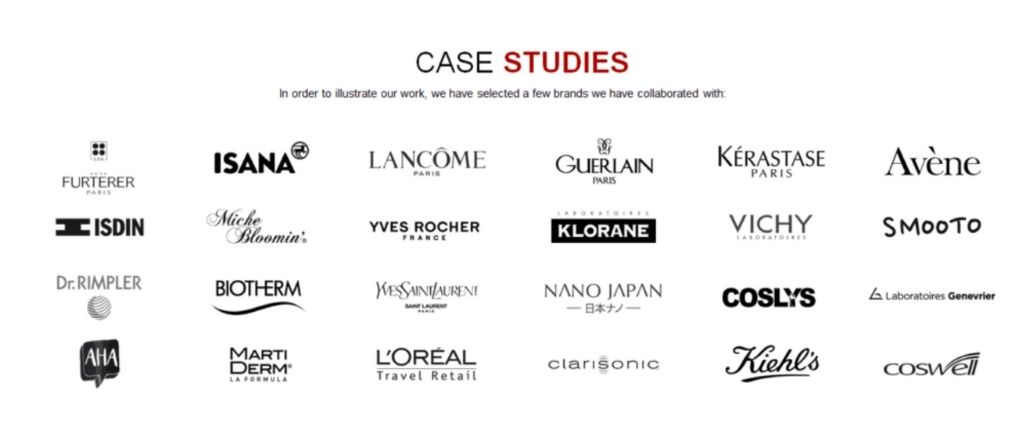
Contact us if you’re interested in selling your brand of beauty products online or offline within this market! We have worked with hundreds of cosmetics brands, helped them find their audience grow in the market. (Ask for our cases studies and a free consultation!)

